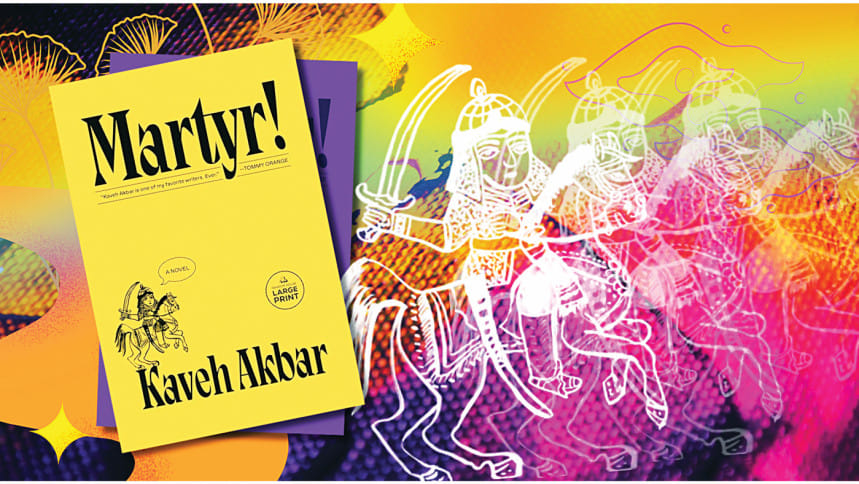When death is a performance

Kaveh Akbar's Martyr! is unruly and endearing. Akbar's years as a poet has given his debut novel an honesty that shines through the book's arduous structure. And for all of Martyr!'s exhilarating tone and emotional trek, the difficulties of writing a novel on addiction, martyrdom, death, and meaning is evident when one reads it.
Cyrus Shams, the main character of Martyr!, is not a complete stand-in for Akbar, but the author lends much of his personality to his creation. They both have moved to the USA from Iran as a toddler, both have suffered from addiction and subsequently found in poetry a strength that aids their recovery.
Yet the strongest moments of Martyr! are those set in an Iran Cyrus would have no recollection of, where his uncle Arash, a soldier during the Iran-Iraq war, rode a horse through the battlefield with a flashlight at night. "He was meant to look like an angel. He was meant to inspire the dying men to die with dignity, conviction. To keep them from suicide."
The reader realises soon that 'Martyr!' becomes vibrant and unforgettable only when the story rewinds to Tehran and Arash.
By comparison, the America where Cyrus is raised and goes to university is unremarkable. Here Cyrus dreams of a suicide that would be meaningful. He plans to write a book of martyrs (snatches of poetry from this work-in-progress pepper throughout Martyr! and often tend to outshine the novel proper). Akbar spends pages to paint Cyrus's university life as one of jolly bohemia full of open-mics at college-town cafes and casual experimentation of drugs and literary styles, yet it is those images of Arash before, comforting soldiers as an angel of death that I could not shake away long after finishing the book.
Briefly after Cyrus is born in Tehran, the Americans missile down an Iranian passenger flight, killing 290 people on board. Cyrus loses his mother Roya, who was to visit Arash in Dubai. Cyrus's father, overwhelmed with grief, soon immigrates to the very country that has killed his wife—an America where the father works at a chicken farm day in and out, where the library launches Cyrus into a world of imagination and creativity. "You're the most American kid I know," his sponsor, Gabe, tells him after an AA meeting. His only connection to Iran now being an annual birthday phone-call to his uncle back home.
The reader realises soon that Martyr! becomes vibrant and unforgettable only when the story rewinds to Tehran and Arash. Much of Martyr! however takes place over four days in Brooklyn, New York, where Cyrus is enamoured with an Iranian performance artist documenting herself dying from cancer in the form of an art exhibition. Cyrus believes she holds some needed insight into his obsession with martyrs, one that would surely benefit his book.
Though in my experience, poets often tend to write mediocre novels, Kaveh Akbar's Martyr! is too heartfelt to be brushed aside. His prose reminds one of Turgenev, where absences of a tighter plot cannot subdue the intelligence and magnanimity of the all too real characters. As Cyrus and Orkideh, the dying artist, confer on the nature of a meaningful death, Kaveh Akbar cites Hamlet, the ambassador of death himself.
"He felt like Hamlet," Cyrus thinks, "just moping around waiting for the world to assuage his grief…" but as Orkideh prepares to die after shocking Cyrus to his core, one sees that Cyrus may feel like Hamlet, but as he eagerly and passively witnesses the performance of dying, he really is Horatio. He lives to tell the tale.
Shahriar Shaams has written for Dhaka Tribune, The Business Standard, and The Daily Star. Find him on instagram: @shahriar.shaams.

 For all latest news, follow The Daily Star's Google News channel.
For all latest news, follow The Daily Star's Google News channel. 



Comments